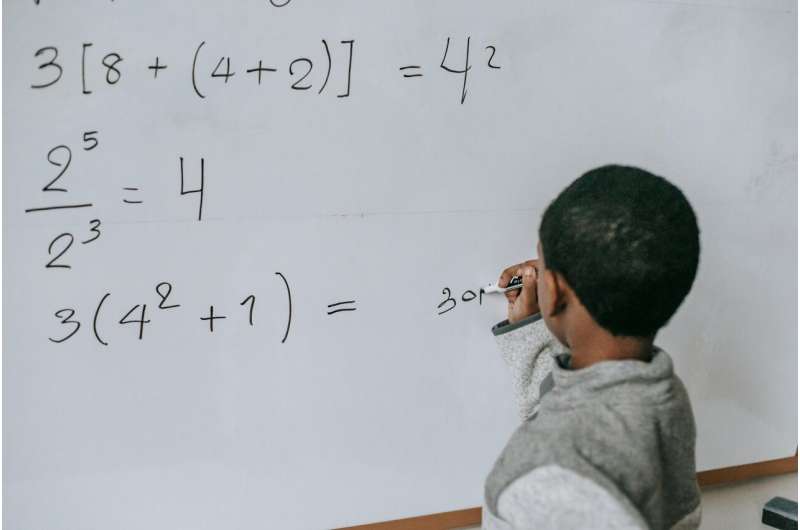Why expanding access to algebra is a matter of civil rights

, who helped register Black residents to vote in Mississippi during the Civil Rights Movement, believed civil rights went beyond the ballot box. To Moses, who was a teacher as well as an activist, math literacy is a civil right: a requirement to earning a living wage in modern society. In 1982, he founded the to ensure that "students at the bottom get the math literacy they need."
As a researcher who studies of students, I believe a new approach that expands access to algebra may help more students get the math literacy Moses, who died in 2021, viewed as so important. It's a goal districts have long been struggling to meet.
Efforts to have been taking place for decades. Unfortunately, the math pipeline in the United States is fraught with persistent . According to the —a congressionally mandated project administered by the Department of Education—in 2022 only 29% of U.S. fourth graders and 20% of U.S. eighth graders were proficient in math. Low-income students, students of color and multilingual learners, who tend to have on math assessments, often do not have the same access as others to qualified teachers, high-quality curriculum and well-resourced classrooms.
A new approach
The Dallas Independent School District—or Dallas ISD—is gaining for increasing opportunities to learn by raising expectations for all students. Following in the footsteps of , in 2019 the implemented an innovative approach of having students be automatically enrolled rather than opt in to honors math in middle school.
Under an opt-in policy, students need a parent or teacher recommendation to take honors math in middle school and Algebra 1 in eighth grade. That policy led both to low enrollment and very little diversity in honors math. , especially those who are Black or Latino, were not aware how to enroll their students in advanced classes due to a lack of communication in many districts.
In addition, , which exists in all demographic groups, may influence teachers' perceptions of the behavior and academic potential of students, and therefore their . Public school teachers in the U.S. are than the students they serve.
Dallas ISD's policy overhaul aimed to and bridge educational gaps among students. Through this initiative, every middle school student, regardless of background, was enrolled in honors math, the pathway that leads to taking Algebra 1 in eighth grade, unless they opted out.
Flipping the switch from opt-in to opt-out led to a dramatic increase in the number of Black and Latino learners, who constitute . And the district's overall math scores remained steady. About , triple the prior level. Moreover, are passing the state exam.
Efforts spread
Other cities are taking notice of the effects of Dallas ISD's shifting policy. The San Francisco Unified School District, for example, in February 2024 to implement Algebra 1 in eighth grade in all schools by the 2026-27 school year.
In fall 2024, the district will pilot three programs to offer . The pilots range from an opt-out program for all eighth graders—with extra support for students who are not proficient—to a program that automatically enrolls proficient students in Algebra 1, offered as an extra math class during the school day. Students who are not proficient can choose to opt in.
Nationwide, however, districts that enroll all students in Algebra 1 and allow them to opt out are . And some stopped offering eighth grade Algebra 1 entirely, leaving students with only pre-algebra classes. Cambridge, Massachusetts—the city in which Bob Moses founded the —is among them.
Equity concerns linger
Between 2017 and 2019, district leaders in the phased out the practice of placing middle school students into "accelerated" or "grade-level" math classes. Few middle schools in the district now offer Algebra 1 in eighth grade.
The policy shift, designed to improve overall educational outcomes, was driven by concerns over significant racial disparities in advanced math enrollment in high school. Completion of Algebra 1 in eighth grade allows students to climb the math ladder to more difficult classes, like calculus, in high school. In Cambridge, the students who took eighth grade Algebra 1 were ; Black and Latino students enrolled, for the most part, in grade-level math.
Some families and educators contend that the district's decision made access to advanced math classes . Now, advanced math in high school is more likely to be restricted to students whose parents can afford to help them prepare with private lessons, after-school programs or private schooling, they said.
While the district has tried to improve access to advanced math in high school by offering a free online summer program for incoming ninth graders, .
Perhaps striking a balance between top-down policy and bottom-up support will help schools across the U.S. realize the vision Moses dreamed of in 1982 when he founded the Algebra Project: "That in the 21st century every child has a civil right to secure math literacy—the ability to read, write and reason with the symbol systems of mathematics."
Provided by The Conversation
This article is republished from under a Creative Commons license. Read the .![]()




















